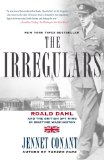Summary | Excerpt | Reviews | Beyond the Book | Readalikes | Genres & Themes | Author Bio

Roald Dahl and the British Spy Ring in Wartime Washington
by Jennet Conant
Marsh, who was actually born in Cincinnati, Ohio, had risen from the ranks as a lowly reporter to become managing editor of the Cincinnati Post before forming a partnership with E. S. Fentress, a business manager in the E. W. Scripps chain, on a buying spree that ended up with them owning nineteen daily newspapers in Texas, including the Austin American and the Statesman. By 1930 Marsh had merged with Eugene Pulliam, the owner of nine dailies in Oklahoma and Indiana, to form General Newspapers, Inc., which they grew into an enormous publishing empire. As the principal of several holding companies, and owner of newspaper chains that extended from Texas through the South to New England, Marsh was an active voice in American politics and an influential behind-the-scenes figure in Washington, but unlike most of the players Dahl had encountered in the nation's capital, he eschewed publicity, preferring to manipulate people and events from the privacy of his R Street study.
In 1940 he had sold all his jointly held newspapers -- except for three dailies in Waco, Austin, and Port Arthur -- and focused his drive and energy on fighting the Axis powers. As bombs rained down on London that winter, Marsh, working together with his friends Walter Lippmann, Senator Claude Pepper, and Ben Cohen, a member of Roosevelt's "brain trust," helped draft a plan that outlined a novel way to send military aid to Britain. At the time, Roosevelt had just won reelection, burying his Republican challenger, Wendell Willkie, by a five-million-vote margin. Churchill had come to him hat in hand, with another desperate plea for military aid, asking for ships, bombers, and munitions. The difficulty was that Britain was low on dollars, and Churchill wanted to write an IOU for the armaments -- even though the Neutrality Acts demanded cash payment. In a press conference, Roosevelt responded by emphasizing Britain's plight and drawing a homely parable about a man lending his neighbor his garden hose to put out a fire. With FDR's "garden hose" endorsement, Pepper was able to get the new legislation through the Foreign Relations Committee, and after months of bitter debate it was finally passed as the Lend-Lease Act on March 11, 1941. That December Roosevelt, in one of his nationally broadcast fireside chats, declared that the United States had to become the "great arsenal of democracy," taking the country another step down the road from neutrality toward active involvement in the conflict. To the British, Lend-Lease had made all the difference, allowing them to withstand the Nazi onslaught, and they would not forget the crucial role Marsh had played in the early days of the war.
Marsh, then in his mid-fifties, was a large man in both stature and ideas and that rare individual who stood almost eye to eye with Dahl. He had a huge head and gleaming bald pate and was classically ugly in a way that was compelling. He was the sort of person of whom legends were made, and his personal life was correspondingly baroque. Marsh had fathered five children, three of whom were in their twenties, by a wife he had left behind in Texas, as well as two infants by his very young, very beautiful bride, Alice Glass. Then there was Alice's decidedly plain sister, Mary Louise, who lived with them and served as his personal secretary and ran the establishment with intimidating efficiency. Also part of this menagerie was Claudia Haines, Marsh's pretty, dark-haired typist, who had been hired by Alice because the divorced mother of two had needed a job, and Alice had taken pity on her. Dahl, no stranger to the rivalries that can develop in a household of women, made a quick study of the unusual arrangement and came to his own conclusions. The sexual tension in the air was thick enough to cut with a knife, and talk of affairs by both Charles and Alice was rampant among their friends. Ralph Ingersoll, in an unpublished memoir of Marsh, painted the indelible scene that greeted visitors to the R Street house: "Hawk-beaked Charles, the sultan in his castle, off-handedly gracious with his mini-harem in attendance."
Copyright © 2008 by Jennet Conant
Your guide toexceptional books
BookBrowse seeks out and recommends the best in contemporary fiction and nonfiction—books that not only engage and entertain but also deepen our understanding of ourselves and the world around us.